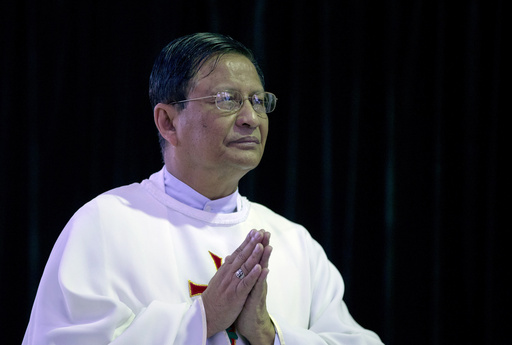
BANGKOK — The primary body coordinating opposition against Myanmar’s military regime has reported the detention of ten alleged members of a local resistance faction connected to the recent assassination of a Catholic village priest in the northwest region of the country.
The late Father Donald Martin Ye Naing Win, aged 44, is thought to be the inaugural Catholic cleric targeted in the ongoing civil conflict that erupted following the military’s takeover from the democratically elected government led by Aung San Suu Kyi four years ago. He served in a church located in the Shwebo township, which is recognized as a stronghold for armed resistance movements in the Sagaing region.
On Monday, the Home Affairs and Immigration Ministry of the opposing organization known as the National Unity Government issued a statement confirming that the Shwebo branch of its armed wing, the People’s Defense Force, along with local resistance groups, made the arrests on the same day the priest was killed.
The initial investigation indicated that those apprehended were part of a local defense unit. The shadow government’s Defense Ministry announced plans to conduct a more thorough investigation, although it did not specify any potential motives for the attack.
In its statement, the National Unity Government expressed strong disapproval of any actions that target civilians, including members of the clergy.
In the struggle for reinstating democracy against military rule, resistance fighters from the Buddhist Burman ethnic majority have allied with historically marginalized ethnic groups, several of which have significant Christian demographics. While nearly 90% of Myanmar’s population identifies as Buddhist, Christians account for approximately 6%.
Human rights organizations have accused security forces of targeting civilians indiscriminately and disproportionately, with churches and other worship sites—such as Buddhist temples—frequently subjected to attacks, including aerial bombardments.
While some Christian clergymen have faced violence, the underlying reasons remain frequently ambiguous. In one instance from March of the previous year, a Baptist pastor named Nammye Hkun Jaw Li was fatally shot by armed assailants in the northern Kachin state. Following shortly after, another parish priest in Kachin, Paul Hkwi Shane Aung, was seriously injured when targeted by two gunmen.
There have been no other widely reported incidents of resistance groups attacking clergymen from Christian backgrounds up until now.
In reaction to the violence, Cardinal Charles Bo, who leads the Catholic Bishops’ Conference of Myanmar, released a statement on Sunday acknowledging the news of the priest’s murder.
He expressed hope that “the blood and sacrifices of countless innocent individuals, alongside Father Donald Martin Ye Naing Win, will become a plea to end the violence engulfing our nation,” and called for accountability for those responsible, though he did not provide a rationale for the priest’s death.
Independent media outlets in Myanmar, such as Myanmar Now and the Democratic Voice of Burma, reported that Ye Naing Win was attacked and fatally stabbed within the confines of the Our Lady of Lourdes Church in Kan Gyi Taw village, located roughly 65 kilometers (40 miles) north of Mandalay.
Additionally, Myanmar Now mentioned that the priest had been accused of serving as an informant for the military.
Militant groups have undertaken targeted assassinations, sabotage activities, arson, and minor bombings as part of their resistance to military authority. The usual targets include individuals perceived as informants or collaborators, although many of these individuals are merely local officials who often resign under threat.
The National Unity Government asserts that its forces must adhere to a code of conduct prohibiting the killing of unarmed civilians. However, given the loosely structured nature of the People’s Defense Forces, many local factions operate independently of this code.

